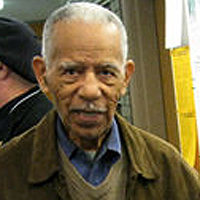
DETROIT – Dave Moore, a veteran of the Ford Hunger March and a founder of United Auto Workers Local 600 who helped shape the history of Detroit and the entire country, died here Oct. 26, at the age of 97. He was born on April 6, 1912 in, as he said, “the slave state of South Carolina.”
On March 7, 1932, Moore was among thousands of people marching on the Ford Motor Co.’s Rouge plant in Dearborn, Mich., in what is known today as the Ford Hunger March. Some 3,500 hungry, unemployed people marched to Ford’s flagship Rouge plant demanding jobs – only to be assaulted with fire hoses, clubs and guns by the company’s “Service Department” in concert with the Dearborn police.
Five of Moore’s comrades fell victim to Ford’s hired thugs. “It was,” he later recalled, “a turning point in my life; that day I was no longer a boy, but a man.” The Hunger March taught him the importance of interracial unity of the workers. “We were white, Black, Mexican, of all religions and creeds,” and that unity is what led to the union organizing victories later on, he said.
Moore said it was the Hunger March that inspired the union drive, and it was the racial unity inspired by the marchers that helped overcome divisions provoked by the Ford Motor Co.
But it was a lesson the union’s leadership had to learn the hard way. When the UAW mounted an organizing drive at Ford in 1939, the CIO and UAW leadership at first ignored the 17,000-plus Black workers. But, Moore said, “Ain’t no way in hell they could organize Ford without Black workers. They came to realize that when they took the vote in 1939 and got the shit beat out of them.”
In 1940, the UAW began another drive to organize the Rouge. CIO leaders John L. Lewis and Phillip Murray came to Detroit and changed their tune, saying all workers would be under one umbrella together.
Moore and other African Americans played a key role in convincing Detroit’s skeptical Black population of the benefits of unions. He and others urged the UAW to bring Paul Robeson to Detroit to speak and sing for the union. Robeson did so three times. The last time, in May 1941, more than 100,000 people filled Cadillac Square in downtown Detroit to hear him.
Meanwhile Moore and others initiated a wildcat strike and shut down the Rouge. The UAW leadership had not authorized the strike but the workers’ feelings were so strong that they walked out. The union leadership was won to follow the workers’ lead. On June 30, 1941, the UAW-CIO signed a contract with Ford. This time a majority of the workforce had voted for the union and thousands of African American workers provided the margin of victory.
Communist Bill McKie, the legendary organizer who first gave Moore a union leaflet in 1936, said, “The strike was called by the workers themselves; and when [union leaders] Reuther, Frankensteen and company arrived at Gate 4 it was already in full swing. Everywhere the men took over, as in Gear and Axle, where six rank and filers, like Dave Moore, pulled the switch.” McKie also said, “The Negroes on the picket line, under the leadership of men like Dave Moore, Nelson Davis, Veal Clough, Joe Billlups, Harold Robinson, showed by example what they meant. For the line was solidly Negro-and-white.”
Three weeks later, Dave was elected a union district committeeman in the Gear and Axle Plant. Over the years, in that plant, Dave was elected a bargaining committeeman, vice-president, and General Council member.
During the McCarthy era, Moore and fellow officers of the local – John Gallo, Nelson Davis and Ed Locke – were found guilty of being sympathetic to the Communist Party and were removed from their elected positions. In 1963, on threat of legal action, the four were reinstated. Five months later and 12 years after being removed, the four were all re-elected overwhelming by the rank and file.
In 1972, when UAW President Leonard Woodcock offered Moore a position as international representative, Moore later said his initial reaction was “Hell no.” He recalled, “I just could not believe that after being disbarred for 12 long years I would be offered a job at Solidarity House,” the union’s national headquarters in Detroit.
But after meetings between the officers of Local 600 and Woodcock, at the local’s urging he accepted the position.
Moore was a founding member of the National Negro Labor Council. He served as a legislative assistant to the late Rep. George Crockett Sr. (D-Mich.). When Congressman Crockett retired in 1990, Mayor Coleman A. Young appointed Moore director of the city’s Senior Citizens Department.
Dave never lost his love of sports both as a fan and participant. He was a member of an all-Black water polo team that battled discrimination but won the city championship in the early 1930s. It was, he said, the only all-Black water polo team to ever win a championship anywhere in the country. He played baseball, loved to bowl, and found great pleasure when Detroit’s Martin Luther King High School became the first Detroit public high school to win a state football championship in 2007.
When it became clear in October 2008 that Barack Obama might actually win the presidency, Dave said he was “blown away” by the white votes Obama received during the primaries. “Sometimes I don’t know if I’m dreaming,” he commented.
Dave Moore was among those who brought Ford, then the third most powerful industrial giant in the world, to its knees by forcing it to recognize the UAW.
During his career, he drew many accolades.
Rep. Crockett described Moore as “an individual whose determination, honesty, courage and ability cannot be questioned.”
Mayor Young called Moore “a good man to have with you when the going gets rough. He will make the rough get going.”
On learning of Moore’s death, Sam Webb, national chair of the Communist Party, said “Dave was a legendary and wonderful comrade. What he did opened the door for all working people to make gains.”
Photo: PW/Pepe Lozano













Comments